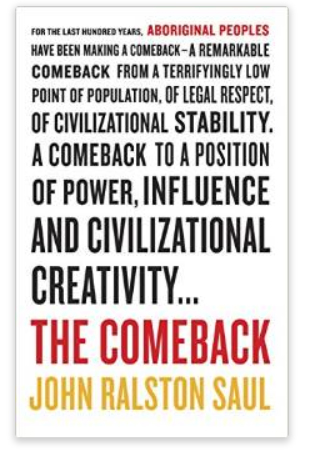Book review: Don’t call it a comeback
 By Christine Smith (McFarlane)
By Christine Smith (McFarlane)
The Comeback is a timely book in the sense that it is written at a time in which the political landscape of Canada is changing in both the non-Aboriginal world and the Aboriginal world.
Author John Ralston Saul delves into many theories and explanations of why Canada is shaped the way that it is. He also calls upon all Canadians to rebuild their relationship with Aboriginal people because it is the centrality of Aboriginal issues and peoples that has the potential to open up a more creative way of imagining ourselves and a more honest narrative for Canada.
He writes “for the last hundred years Aboriginal peoples have been making a comeback- a remarkable comeback from a terrifyingly low point of population, of legal respect, of civilizational stability, a comeback to a position of power, influence and civilizational creativity” but I beg to differ on this statement and find it to be misleading.”
I find it to be misleading because as a First Nations woman, I believe that the current state of affairs in Canada is not about a comeback. First Nations people have always been present and we have always had our rights and have known where they come from. Furthermore, a comeback from a terrifyingly low population is not a result of our own actions, but a result of the dominant takeover of European peoples-colonization.
Our ways of life, our economic well being, social well- being and food sources were jeopardized. European diseases that were brought through contact were particularly destructive and Aboriginal peoples lives were lost. I have always understood that there is a deep contradiction in the reality and the mythology of Canadian life. Saul backs this up by stating “it was in the forty years before the European civil war began that Canadians of European origin decided that ‘Indians’, ‘Half-breeds’ and ‘Esquimaux’ were among the destined losers when faced by our superiority-our Darwinian destiny.”
Another commentary I am uncomfortable with is the idea that Indigenous peoples have made a comeback due to the events of 2012 and the Idle No More Movement. I believe that everything began a lot sooner than that. There are several pivotal moments in Aboriginal history that paved the way for us to be where we are today. You just need to think of the example of OKA and the voices of solidarity of the time.
Ralston Saul writes a wide narrative that may seem pivotal when it comes to speaking of citizens rights and the rebuilding of relationships that were central to the creation of Canada, but I believe it will take a lot more work for the general Canadian public to reach a point where they will understand First Nations peoples and the issues at hand.
It’s more than just getting the narrative right, and it is more than just being informed and conscious. We do not see ourselves as victims and it is not sympathy that we want. Taiaike Alfred argued that “reconciliation can mean something if it starts from the position of restitution” – and I believe that is something to begin with.
The Comeback by John Ralston Saul is published by the Penguin Group, Penguin Books Canada and is 294 pages ISBN-13: 978-0670068739.

